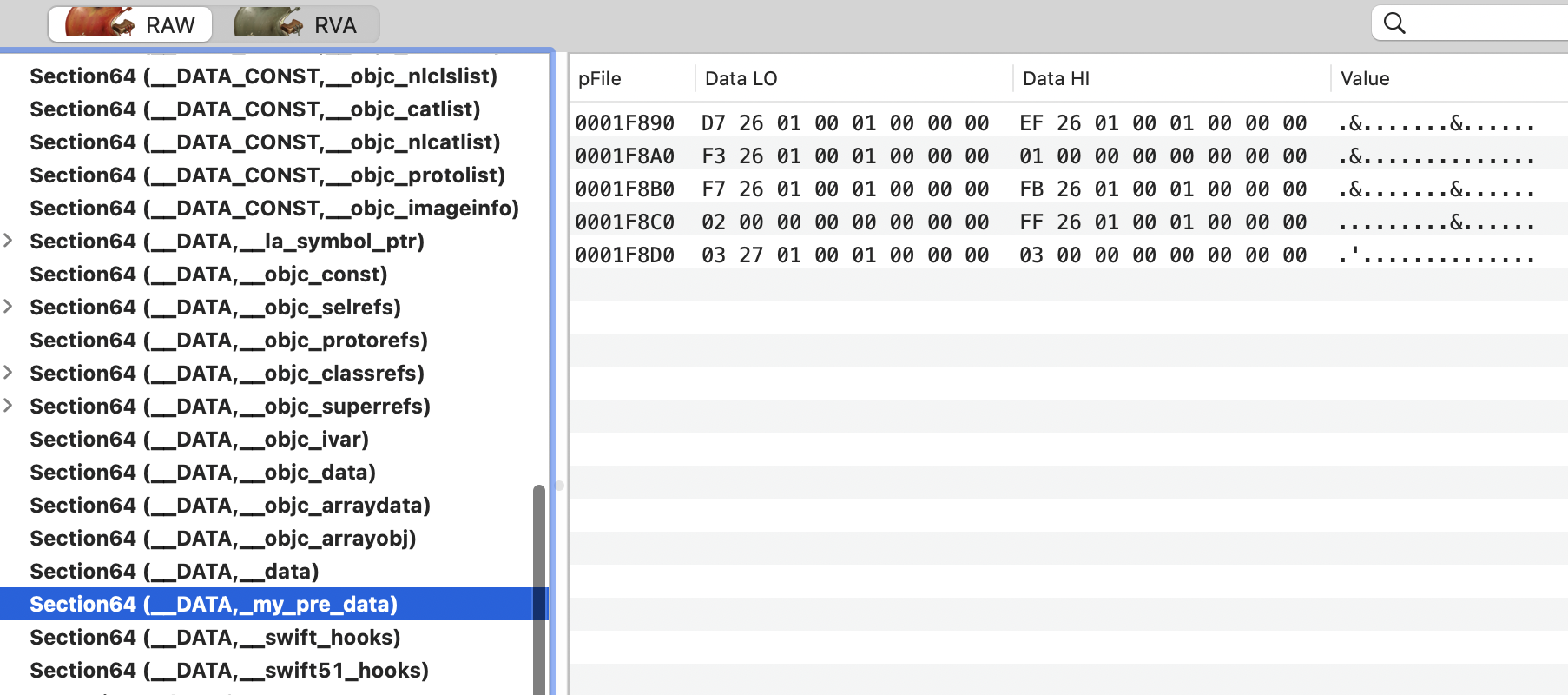在 Mach-O 中读写数据
Table of Contents
背景 #
我们有时会遇到这种需求:在程序启动时立即需要知道某些数据。
一个例子是,我们在解耦时会定义一些协议,用于模块间沟通,这些协议与实现类的关联关系就是这样一种数据,如果通过本地文件读写可能来不及,因为这个协议的反射调用可能非常早。如果不及时获取映射数据,会导致调用失败。
原理 #
之前在
app 启动过程 一文中提过,main 函数之前系统会让 dyld 去加载 app 依赖的各种动态库,
这里系统提供了一个回调方法,可以让我们获知这些库被加载进内存的时机。
在 <mach-o/dyld.h> 中
/*
* The following functions allow you to install callbacks which will be called
* by dyld whenever an image is loaded or unloaded. During a call to _dyld_register_func_for_add_image()
* the callback func is called for every existing image. Later, it is called as each new image
* is loaded and bound (but initializers not yet run). The callback registered with
* _dyld_register_func_for_remove_image() is called after any terminators in an image are run
* and before the image is un-memory-mapped.
*/
extern void _dyld_register_func_for_add_image(void (*func)(const struct mach_header* mh, intptr_t vmaddr_slide)) __OSX_AVAILABLE_STARTING(__MAC_10_1, __IPHONE_2_0);
extern void _dyld_register_func_for_remove_image(void (*func)(const struct mach_header* mh, intptr_t vmaddr_slide)) __OSX_AVAILABLE_STARTING(__MAC_10_1, __IPHONE_2_0);
在这个回调方法中,我们可以拿到 mach_header 的指针,就可以读写 section 中的数据,具体实现在下一节介绍。
解决了读的时机问题,那么我们怎么写数据呢?
我们知道静态变量是存储在 Mach-O 的静态存储区,比如定义一个 NSString:
static NSString * const s_myStr = @"The quick brown fox jumps over the lazy dog";
通过 MachOView 可以发现,具体是存储在 section 段的 __TEXT,__cstring 区块中。

存储数据 #
所以,我们有没有办法在 section 中存储自定义的数据呢?有!
__attribute((used, section("__DATA,_my_pre_data"))) static const char *quote = "Practice makes perfect.";
声明这样一个静态变量之后,会发现 __DATA 中多了一个区块,但是定义的字符串并不在这里。这里只存储了字符串的地址,数据仍然存储在
__TEXT,__cstring 区块中。


实现 #
有了上述的背景知识,我们就可以读写自己的数据了。
假如我们有这样一个数据结构:
typedef struct {
char *key;
char *val;
int idx;
} my_data_t;
那么,写入 section 段就是:
__attribute((used, section("__DATA,_my_pre_data"))) static my_data_t dt1 = {
"kkk1",
"vvv1",
1,
};
为了便于通用,我们可以定义一个宏,方便自动创建这样的静态变量:
#define _PRELD_SECNAME "_my_pre_data"
#define _STR(name) (#name)
#define _PRELD_DATA(_k, _v, _i)\
__attribute((used, section("__DATA," _PRELD_SECNAME))) static my_data_t _dt##_k = \
{\
_STR(_k),\
_STR(_v),\
_i,\
};\
用起来非常方便:
_PRELD_DATA(kkk, vvv, 1)
读取数据 #
前面说过,注册 dyld 加载的回调即可读取 section 中存储的数据:
__attribute__((constructor)) void preMainMethod() {
_dyld_register_func_for_add_image(dyld_func);
}
__attribute__((constructor)) 使用这种描述的 C 方法就可以在 main 之前执行。
那么 dyld_func 如何实现呢?
static void dyld_func(const struct mach_header *header, intptr_t slide) {
unsigned long size = 0;
#if defined(__LP64__) && __LP64__
const struct mach_header_64 *mhp64 = (const struct mach_header_64 *)header;
uintptr_t *memory = (uintptr_t *)getsectiondata(mhp64, SEG_DATA, _PRELD_SECNAME, &size);
#else
uintptr_t *memory = (uintptr_t *)getsectiondata(header, SEG_DATA, _PRELD_SECNAME, &size);
#endif
unsigned long n = size / sizeof(my_data_t);
my_data_t *data = (my_data_t *)memory;
for (int i = 0; i < n; i++) {
my_data_t tmp = data[i];
std::cout << tmp.key << ": " << tmp.val << "(" << tmp.idx << ")" << std::endl;
}
}
这里可能会有一个疑问,既然这个回调方法是每次加载 image 时都会调用,这个读取不是会多次执行吗?
是的,但是只有 image 是 app 本身时才能读取到数据。因为我们写入数据的 section 是在 app 本身的 Mach-O 中的。
副产品 #
那么能不能获取到 app 启动到底加载了哪些库呢?
在 #include <dlfcn.h> 中,有这样一个数据结构:
/*
* Structure filled in by dladdr().
*/
typedef struct dl_info {
const char *dli_fname; /* Pathname of shared object */
void *dli_fbase; /* Base address of shared object */
const char *dli_sname; /* Name of nearest symbol */
void *dli_saddr; /* Address of nearest symbol */
} Dl_info;
我们可以使用 dladdr() 获取它:
Dl_info DlInfo;
dladdr(header, &DlInfo);
const char* image_name = DlInfo.dli_fname;
std::cout << image_name << std::endl;
搞定!